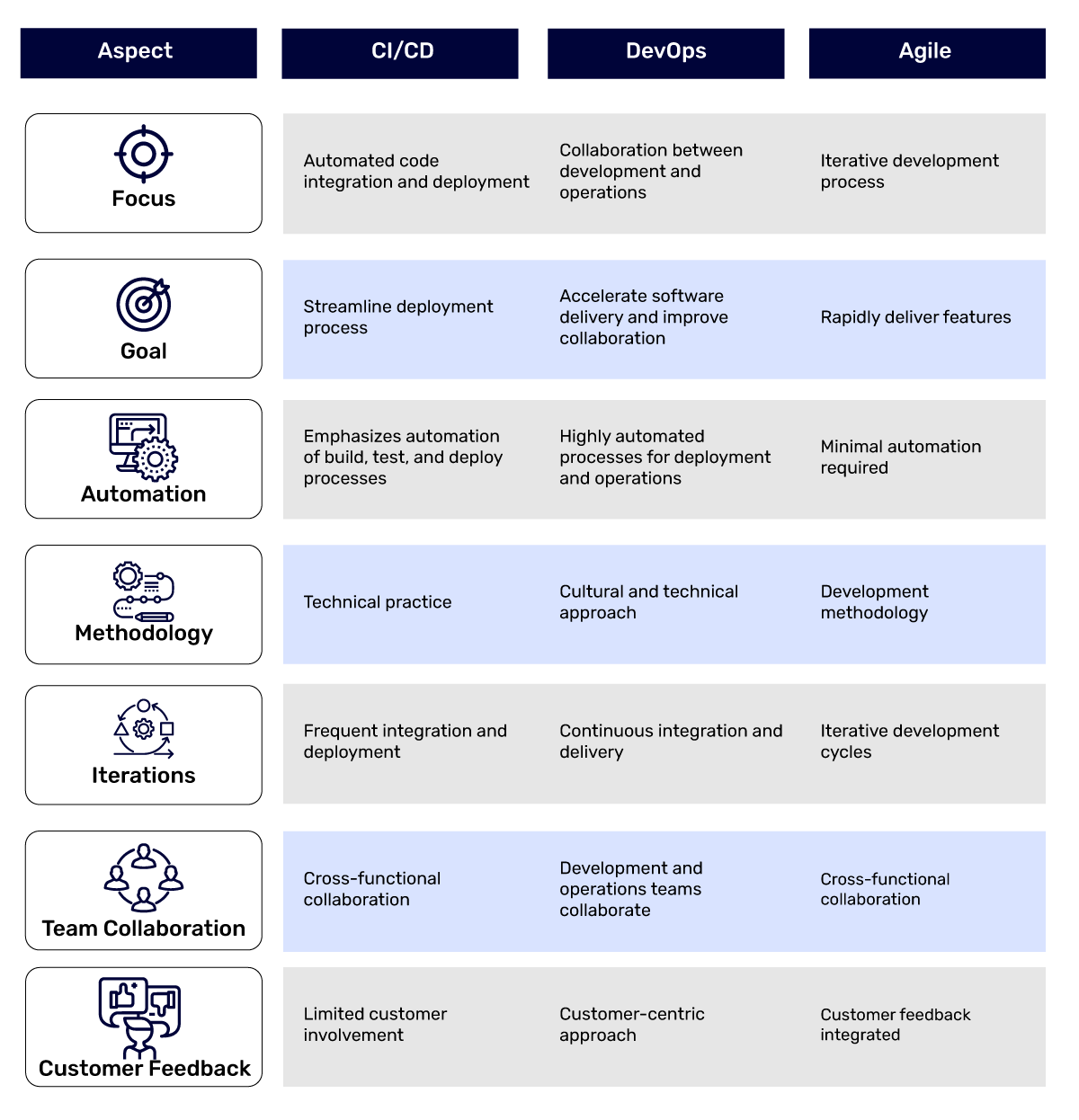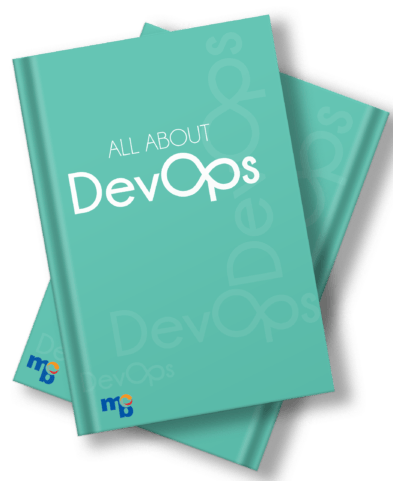As the digital era is expanding exponentially, many professionals agree that speed and quality are essential to be successful. According to Harvard Business Review Analytics, 86% of the participants agreed to the importance of quickly developing and releasing new software into production. With increasing numbers of companies adopting better and streamlined ways of working, DevOps plays an important role in effectively achieving their goals.
One of the best ways to adapt to efficient and collaborative methodologies is by embracing CI/CD, DevOps, and Agile. If you are new to these terms, worry not! In this blog post, our DevOps engineer Manish Kumar Singh will guide you through what CI/CD, DevOps, and Agile are and how they are connected yet different from each other.
So, let’s get started without any further delays!
CI/CD, comprising Continuous Integration and Continuous Delivery/Continuous Deployment, is an essential part of modern software development. It focuses on automating the building, testing, and deployment processes to ensure a reliable and efficient pipeline.
CI/CD practices aim to automate the process of integrating code changes into a shared repository, followed by their deployment in the product environment. Moreover, CI/CD ensures software changes are tested well while having a faster time in the market.
With CI/CD, companies can reduce integration conflicts, leading to consistent software quality levels. Additionally, CI/CD helps companies minimize human errors while accelerating the release cycle by automating the build, test, and deployment processes.
Developers integrate code changes into a shared repository multiple times a day. Automated tests are run to detect integration issues early.
Continuous Delivery ensures that the software is always in a deployable state, while Continuous Deployment automatically deploys changes to production after passing all tests.
Rigorous automated testing guarantees the stability and reliability of the codebase throughout the development process.
DevOps is a fusion of cultural philosophies, practices, and tools that focuses on seamless collaboration between the development(Dev) and IT operations (Ops) teams by breaking the traditional silos and legacy systems.
Companies implement DevOps to shorten the software development lifecycle without compromising on the quality of the final release codes, leading to improved customer experiences and services.
As DevOps highly focuses on automation, faster and easier communication, and shared responsibilities among the development and operational teams, it becomes possible for stakeholders to accelerate innovation and improve the overall efficiency of software delivery.
DevOps breaks down silos, promoting collaboration between development, operations, and other stakeholders.
Automation of manual processes streamlines workflows, reduces errors, and accelerates delivery.
Continuous monitoring ensures feedback is collected in real-time, allowing quick adjustments and improvements.
Agile is a project management and product development approach that prioritizes flexibility and adaptability. It revolves around iterative development, with a focus on customer feedback and collaboration among cross-functional teams.
Agile in the software development industry represents an umbrella term that includes frameworks and practices expressed in the Manifesto for Agile Software Development and the 12 Principles behind it. With this guide, you can approach software development in a particular manner with set values and principles that help you figure out what you should do in a particular context.
With Agile methodology, companies can quickly adapt to changing requirements and customer feedback, resulting in a more customer-oriented and responsive development process.
The major difference between Agile CI/CD and DevOps is that Agile focuses on end-users contributing to the process and intense team collaboration. With Agile, companies create self-organizing cross-functional teams leveraging the right practices in their contexts.
Agile projects are divided into small, manageable iterations called sprints, allowing teams to deliver incremental value regularly.
Constant customer involvement ensures that the delivered product aligns with evolving requirements and expectations.
Agile encourages the formation of multifunctional teams, fostering collaboration among developers, testers, and other stakeholders.
In the software development industry, the terms Agile, CI/CD, and DevOps are used quite often, and all three are connected when you look at the bigger picture. The fundamental difference between Agile, CI/CD, and DevOps is at the levels they operate.
To better understand Agile, CI/CD, and DevOps differences, let’s have a quick one-line overview of how and at which level they operate.
Agile is a broader term encompassing DevOps and CI/CD practices. Agile philosophy is implemented by various methodologies like Scrum, Kanban, and Scaled Agile Framework (SAFe).
DevOps is a part of Agile development practice and mindset that leverages Agile practices like collaboration, communication, and implementation of the right tools to streamline the software development lifecycle.
CI/CD is part of the DevOps ecosystem, focusing on using the right automated testing tools to implement agile development.
As you have a better understanding of Agile, CI/CD, and DevOps, let’s understand the differences between them now:


With a rapidly evolving environment of software development, elevating to modern technologies like CI/CD, DevOps, and Agile is not a choice anymore but a requirement in today’s time. If you don’t welcome these new changes on time, the world will soon leave you behind.
If you are committed to the growth and scalability of your organization, Mindbowser is there to help you achieve your business objectives empowered with the latest technology. At Mindbowser, we help businesses embrace modern software development practices so that you can achieve faster time-to-market with improved quality and enhanced collaboration.
Our experienced DevOps professionals can guide you throughout the software development cycle and provide custom DevOps solutions that match your business requirements.
No, CI/CD and Agile are not the same thing. They are two different methodologies. While CI/CD focuses on automating code integration and deployment of the process, Agile focuses on iterative development cycles, customer collaborations, and flexibility.
No, CI/CD is not DevOps but rather a part of DevOps. The aim of CI/CD is to automate the integration and deployment aspects of the software development life cycle. On the other hand, DevOps focuses on a broader approach of cultural and technical aspects for better collaboration between the development and operational teams.
The foundational principles of CI/CD, DevOps, and Agile include automation, collaboration, iterative development, customer-centricity, and continuous improvement. Based on your methodology, the emphasis on these principles will vary.
The CI/CD Agile approach combines automation and rapid deployment of CI/CD with Agile’s iterative and customer-centric approach. When you leverage the CI/CD Agile approach, you can integrate, test, and deploy codes more frequently based on customers’ requirements.

Increase Profitability, Elevate Work Culture And Exceed Productivity Goals Through DevOps Practices.
Download NowLeave your competitors behind! Become an EPIC integration pro, and boost your team's efficiency.
Register Here

The Mindbowser team's professionalism consistently impressed me. Their commitment to quality shone through in every aspect of the project. They truly went the extra mile, ensuring they understood our needs perfectly and were always willing to invest the time to...

CTO, New Day Therapeutics

I collaborated with Mindbowser for several years on a complex SaaS platform project. They took over a partially completed project and successfully transformed it into a fully functional and robust platform. Throughout the entire process, the quality of their work...

President, E.B. Carlson

Mindbowser and team are professional, talented and very responsive. They got us through a challenging situation with our IOT product successfully. They will be our go to dev team going forward.

Founder, Cascada

Amazing team to work with. Very responsive and very skilled in both front and backend engineering. Looking forward to our next project together.

Co-Founder, Emerge

The team is great to work with. Very professional, on task, and efficient.

Founder, PeriopMD

I can not express enough how pleased we are with the whole team. From the first call and meeting, they took our vision and ran with it. Communication was easy and everyone was flexible to our schedule. I’m excited to...

Founder, Seeke

Mindbowser has truly been foundational in my journey from concept to design and onto that final launch phase.

CEO, KickSnap

We had very close go live timeline and Mindbowser team got us live a month before.

CEO, BuyNow WorldWide

If you want a team of great developers, I recommend them for the next project.

Founder, Teach Reach

Mindbowser built both iOS and Android apps for Mindworks, that have stood the test of time. 5 years later they still function quite beautifully. Their team always met their objectives and I'm very happy with the end result. Thank you!

Founder, Mindworks

Mindbowser has delivered a much better quality product than our previous tech vendors. Our product is stable and passed Well Architected Framework Review from AWS.

CEO, PurpleAnt

I am happy to share that we got USD 10k in cloud credits courtesy of our friends at Mindbowser. Thank you Pravin and Ayush, this means a lot to us.

CTO, Shortlist

Mindbowser is one of the reasons that our app is successful. These guys have been a great team.

Founder & CEO, MangoMirror

Kudos for all your hard work and diligence on the Telehealth platform project. You made it possible.

CEO, ThriveHealth

Mindbowser helped us build an awesome iOS app to bring balance to people’s lives.

CEO, SMILINGMIND

They were a very responsive team! Extremely easy to communicate and work with!

Founder & CEO, TotTech

We’ve had very little-to-no hiccups at all—it’s been a really pleasurable experience.

Co-Founder, TEAM8s

Mindbowser was very helpful with explaining the development process and started quickly on the project.

Executive Director of Product Development, Innovation Lab

The greatest benefit we got from Mindbowser is the expertise. Their team has developed apps in all different industries with all types of social proofs.

Co-Founder, Vesica

Mindbowser is professional, efficient and thorough.

Consultant, XPRIZE

Very committed, they create beautiful apps and are very benevolent. They have brilliant Ideas.

Founder, S.T.A.R.S of Wellness

Mindbowser was great; they listened to us a lot and helped us hone in on the actual idea of the app. They had put together fantastic wireframes for us.

Co-Founder, Flat Earth

Ayush was responsive and paired me with the best team member possible, to complete my complex vision and project. Could not be happier.

Founder, Child Life On Call

The team from Mindbowser stayed on task, asked the right questions, and completed the required tasks in a timely fashion! Strong work team!

CEO, SDOH2Health LLC

Mindbowser was easy to work with and hit the ground running, immediately feeling like part of our team.

CEO, Stealth Startup

Mindbowser was an excellent partner in developing my fitness app. They were patient, attentive, & understood my business needs. The end product exceeded my expectations. Thrilled to share it globally.

Owner, Phalanx

Mindbowser's expertise in tech, process & mobile development made them our choice for our app. The team was dedicated to the process & delivered high-quality features on time. They also gave valuable industry advice. Highly recommend them for app development...

Co-Founder, Fox&Fork
